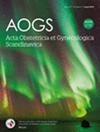子宫内膜癌妇女的雌激素方案
IF 3.5
2区 医学
Q1 OBSTETRICS & GYNECOLOGY
Acta Obstetricia et Gynecologica Scandinavica
Pub Date : 2024-09-12
DOI:10.1111/j.1600-0412.1981.tb00036.x
引用次数: 0
摘要
为了检测瑞典情况下外源性雌激素与子宫内膜癌之间可能存在的联系,我们将 1974-77 年期间 622 例子宫内膜癌病例中以往使用雌激素的情况与随机抽取的 1 866 例癌症病例同时代女性平均使用雌激素的情况进行了比较。在 50-69 岁的女性中,使用 "天然 "和/或 "合成 "雌激素 6-36 个月的情况在两组中同样常见,但使用 3-6 年的情况从 1976 年开始在癌症病例中越来越常见。然而,从 1976 年开始,使用 3-6 年雌激素的情况在癌症病例中越来越常见。将 1974-77 年的情况加在一起,癌症病例长期服用这种药物的比例是对照组的 5 倍多。在这两组人中,额外使用孕激素治疗的情况同样罕见。虽然现阶段还不能断定雌激素具有致癌性,但这种明显的可能性促使人们对处方采取谨慎和限制性的态度。尽管目前还不能证实孕激素能消除子宫内膜癌与雌激素之间的联系,但许多研究人员已经认识到这一点。本文章由计算机程序翻译,如有差异,请以英文原文为准。
ESTROGEN REGIMEN OF WOMEN WITH ENDOMETRIAL CARCINOMA
In order to detect a possible association between exogenous estrogens and endometrial cancer under Swedish circumstances, the previous use of estrogens among 622 cases of endometrial cancer 1974–77 has been compared with that of the average female population, represented by a randomly selected sample of 1 866 contemporaries to the cancer cases.Among women aged 50–69 years, 6–36 months of use of ‘natural’ and/or to a much lesser extent ‘synthetic’ estrogens was equally common in the two groups. However, starting in 1976, 3–6 years of use became increasingly more common among cancer cases. Taking 1974–77 together, cancer cases had been on such a long‐term regimen more than 5 times as commonly as controls. Additional progestagen treatment was equally rare in the two groups. Tumors of estrogen users were of a significantly lower grade than those of non‐users of the same age.While it cannot be concluded at this stage that estrogens are cocarcinogenic, the evident possibility motivates a somewhat cautious, restrictive approach to prescription. Progestagens could be added sequentially, though it is not yet verified that they abolish the association between endometrial cancer and estrogens that is now recognized by many investigators.
求助全文
通过发布文献求助,成功后即可免费获取论文全文。
去求助
来源期刊
CiteScore
8.00
自引率
4.70%
发文量
180
审稿时长
3-6 weeks
期刊介绍:
Published monthly, Acta Obstetricia et Gynecologica Scandinavica is an international journal dedicated to providing the very latest information on the results of both clinical, basic and translational research work related to all aspects of women’s health from around the globe. The journal regularly publishes commentaries, reviews, and original articles on a wide variety of topics including: gynecology, pregnancy, birth, female urology, gynecologic oncology, fertility and reproductive biology.

 求助内容:
求助内容: 应助结果提醒方式:
应助结果提醒方式:


